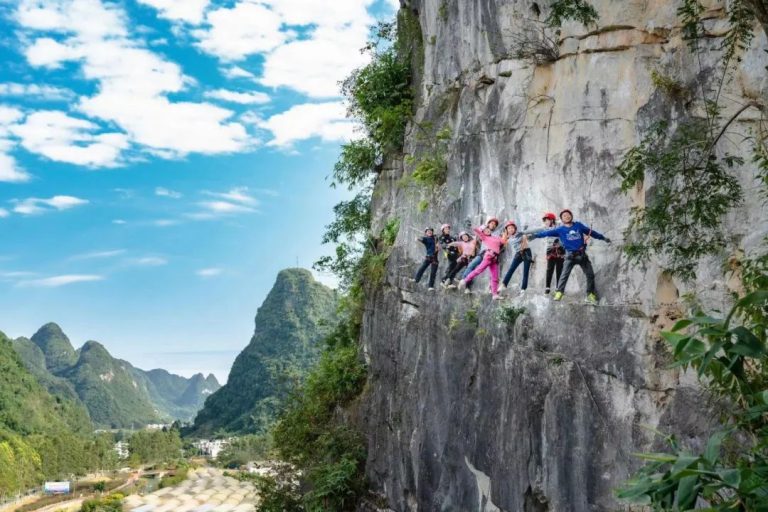
By Li Zong, Zheng Yi, People’s Daily
About 100 kilometers from downtown Nanning, the capital of south China’s Guangxi Zhuang autonomous region, there lies a county known for its prospering rock climbing industry, Mashan County, home to China’s first characterized town with the theme of rock climbing sports.
Mashan, once a national-level impoverished county, features a typical karst landscape. It is surrounded by mountains and hills and covered by infertile soil, which hinders industry development. However, rock climbing has allowed the county to shake off poverty and boost local tourism.
On a sports field in the county, several mountaineering enthusiasts were climbing up a natural cliff.
“This place has gradually made its name in our group,” said Tian Jiayi, a climber with two years of experience from Xi’an, northwest China’s Shaanxi province.
She mentioned Sanjiatun of Yangshan village, Guling township of Mashan, the central area of the “rock climbing characteristic town.” In May 2017, a China-ASEAN rock climbing challenge was held here.
“We invited members of the Chinese Mountaineering Association to the event. They said the natural cliffs here are conducive to developing climbing sports,” said Huang Xujin, head of Mashan County’s Bureau of Culture, radio, television, sports, and Tourism.
In August 2017, supported by the mountaineering management center of the General Administration of Sport of China, the Chinese Mountaineering Association, and the local government, the first “rock climbing characteristic town” of China was settled in Mashan, bringing opportunities to the county whose development had long been trapped by the mountainous landscape.
“In the past, the mountains were a headache for villagers. What they wanted was merely to sell the rocks. They never thought that these stones are so sought after today,” said Huang Linhui, mayor of Guling township.
The place has hosted a series of domestic and international climbing events, such as the China-ASEAN rock climbing challenge and a rock climbing masters tournament under the China-ASEAN Mountain Outdoors Tourism Conference, which made Mashan a big name in the mountaineering community.
Besides, rock climbing sports are also well-developed among students in the county.
In 2018, a national youth rock climbing squad was established in Mashan, which comprised middle school students from the county. Fifty-three professional climbers, including coaches from the national climbing team and outstanding climbing athletes, were hired to guide athletes in 23 local schools.
So far, the county has built about 3,254 square meters of artificial cliffs, and 11 schools have employed climbing facilities, benefiting more than 18,000 students. The county’s education bureau has offered climbing curriculums in 23 primary and middle schools to bring the sport closer to more students.
Wei Junhuan, a student in Mashan County, has joined the national youth rock climbing squad for five years. Wei said climbing is like a window from which he can see a broader world, and competing with climbers across the country helps him become a better athlete.
The national youth squad has made remarkable achievements in both domestic and international climbing events. As of May this year, climbing athletes from the county had won 100 gold medals, 90 silver medals, and 80 bronze medals.
To turn rock climbing popularity into economic development, Mashan County introduced a professional operating company dedicated to the operation and management of the town.
Today, 22 cliffs and 553 professional climbing routes have been developed in the town’s central area. Besides, supporting facilities such as climbing stacks, platforms, professional indoor venues via Ferratas, and car camping sites have also been used.
“Professional athletes can enjoy climbing, while those who cannot climb can also have fun in other outdoor sports,” said Liao Hongshi, executive of the company that runs the characteristic town.
The successful development of the climbing sports industry has helped increase residents’ income.
Liang Fangling, a villager from Yangshan, used to work out of town. After the city started operation, she returned home and became a safety supervisor of a via Ferrata base after training.
“I’m always busy on holidays, and now I can make more money than before,” she told People’s Daily.
Last year, the county received more than 4 million tourist visits, generating tourism revenue of nearly 2.69 billion yuan ($372.66 billion), which forcefully boosted consumption and advanced rural vitalization.










